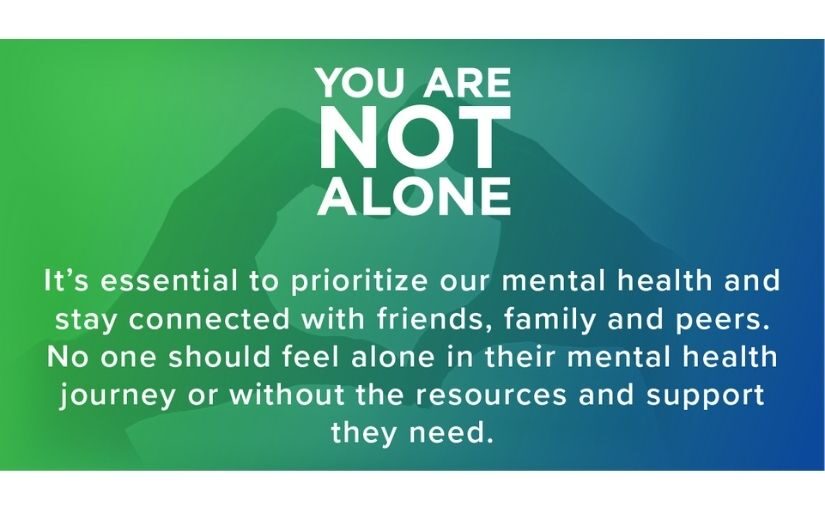May is Mental Health Awareness month and Sunday, May 16th is Mental Health Sunday. The worship service for that Sunday will encourage us to learn all we can and do all we can in the area of mental health.
As a WISE Congregation for Mental Wellness, we will be observing Mental Health Awareness Month, beginning with the Tools2Thrive found in this article, in conjunction with the Tools2Thrive page of our website, and the Orders of Worship for each week in May.
Through these tools, we trust that you will find support and assistance regarding the mental health challenges you may face. If you have family members or friends who may benefit from the Tools2Thrive or the support you can give, please make sure you share the information.
Mental illness is a medical condition that disrupts a person’s thinking, feeling, mood, ability to relate to others and daily functioning. Just as diabetes is a disorder of the pancreas, mental illnesses are disorders of the brain. These illnesses are medical conditions that result in a diminished capacity for coping with the ordinary demands of life when left untreated.
Anyone can have a mental illness. One in four adults experiences a mental-health disorder in a given year. One in 17 lives with a serious mental illness, such as schizophrenia, major depression, anxiety disorder or bipolar disorder. About one in 10 children live with a serious mental or emotional disorder.
Most mental illnesses are treatable. Most people diagnosed with a serious mental illness can experience relief from their symptoms by actively participating in an individual treatment plan, which may include medication, individual or group therapy and activities, and other support services.
Mental illness can disrupt a person’s ability to work, care for himself/herself, and carry on relationships. It affects every aspect of life. However, because mental illness may not be immediately visible to others, the person can be negatively judged as being weak, lazy or uncooperative. This lack of understanding can lead to the stigma of people with mental illness.
Friends and family members feel the impact of mental illness experienced by their loved one. Those feelings can be varied, and family members, friends and caregivers need to be supported amid their experiences.
Some might feel protective of their loved one. Others may feel embarrassed by the social stigma associated with mental health challenges. Still others may feel angry. All may feel helpless to provide support and encouragement. This range of feelings is common, and friends and family members may feel all of these at different points and should be encouraged to seek professional counseling as needed.
You may have heard the phrase, “If you can’t take care of yourself, how are you going to care for someone else?” It is important that you become aware of signs that indicate your need for self-care by engaging in a support group or speaking with clergy or a counselor. This video and the following list may help you recognize those possible signs in yourself or others.
- Excessive worrying or fear
- Feeling excessively sad or low
- Confused thinking or problems concentrating and learning
- Extreme mood changes, including uncontrollable “highs” or feelings of euphoria
- Prolonged or strong feelings of irritability or anger
- Avoiding friends and social activities
- Difficulties understanding or relating to other people
- Changes in sleeping habits or feeling tired and low energy
- Changes in eating habits such as increased hunger or lack of appetite
- Changes in sex drive
- Difficulty perceiving reality (delusions or hallucinations, in which a person experiences and senses things that don’t exist in objective reality)
- Inability to perceive changes in one’s own feelings, behavior or personality (”lack of insight” or don’t grasp what changes others are describing)
- Overuse of substances like alcohol or drugs
- Multiple physical ailments without obvious causes (such as headaches, stomach aches, vague and ongoing “aches and pains”)
- Thinking about suicide
- Inability to carry out daily activities or handle daily problems and stress
- An intense fear of weight gain or concern with appearance
No matter who you are or where you are on life’s journey, you are not alone. If you or someone you know is in need of support, feel free to reach out to The WISE Steering Committee: Pastor Jim, Vickie Ashenbrenner, Mike Astle, Judy Jondahl, Kay Klinkenborg, Phil Ladd, Nancy Nonini, Andrea Stefanov, or Pastor Paul.
You can also utilize any of the phone numbers or services listed below. Keep this handy “Taking Charge of Your Mental Health” guide at your fingertips and watch for more information in the weeks to come.
National Alliance on Mental Illness Help Line 1-800-950-6264 https://www.nami.org/help
Suicide Prevention Lifeline 800.273.TALK
Veteran’s Crisis Line 800.273.8255 press 1
Pastoral Care—Pastor Jim Alexander 623.792.5295 https://thepalms.org/Tools2Thrive
